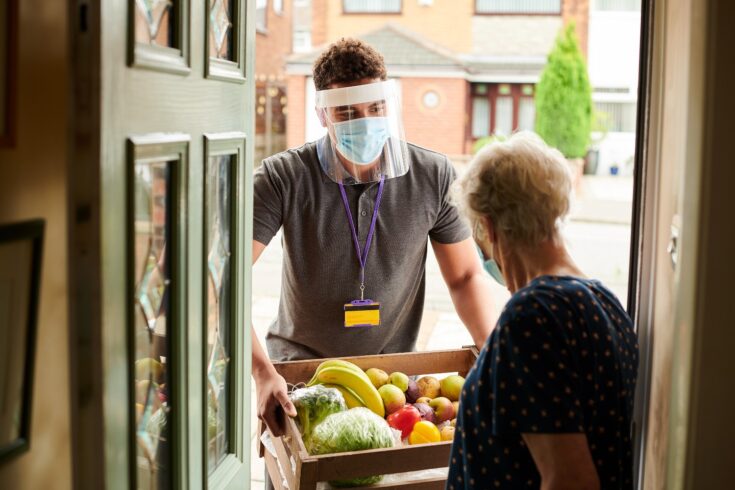When the COVID-19 pandemic hit early in 2020, and ‘lockdown’ restrictions were imposed in late March, the disruptions to social support were felt by all, but most severely by marginalised communities.
Professor Laura Bear’s previous work in west Bengal in India had shown how policies could negatively impact social infrastructures. Based on this work, she stressed the importance of a “social calculus” approach which considers how government interventions affect networks of care and support among marginalised groups. She then applied this insight and approach to understanding the UK economy as a co-manager of the ESRC centre on ‘Rebuilding Macroeconomics’ based at UCL.
As the only anthropologist on the UK government’s Scientific Pandemic Insights Group on Behaviours (SPI-B) and the Ethnicity Subgroup, Professor Laura Bear provided advice to Scientific Advisory Group for Emergencies (SAGE). She based this advice on her social calculus-based approach which considers how government interventions affect networks of care and support among marginalised groups. This advice directly influenced policies including on the right to say goodbye to loved ones, social bubbles for extended family networks, the prevention of racialised stigma and the UK’s first national community health initiative.
Sir Patrick Vallance, Government Chief Scientific Adviser, said:
Professor Laura Bear’s research showing how different socioeconomic groups across the UK experienced the COVID-19 pandemic and highlighted the importance of taking a community-based approach for equitable and effective public health delivery. Such approaches played a key role in managing the response to the COVID-19 pandemic.
Video credit: ESRC.
On-screen captions and an autogenerated transcript are available on YouTube.
About the project
At the start of the pandemic, Professor Bear set up the COVID and Care Research Group at the London School of Economics. This team carried out ethnographic research among marginalised communities in London and the Midlands.
In April 2020 the group’s research revealed that the trauma of COVID-19 deaths was increased by the inability to say goodbye to and mourn loved ones, as well as the lack of public acknowledgement of deaths. Later work revealed the negative impact of restrictions on the extended families of marginalised groups, and the growth of racialised stigma when groups were singled out in media and government communications.
Professor Bear’s research also highlighted community efforts to help the most vulnerable. Her advice was central to the design and implementation of the government’s Community Champions: a collaborative scheme whereby local volunteers connected services with local people and improved health and wellbeing.
Professor Bear said:
My research helped government take account of the vital role played by social infrastructures in helping us cope with COVID-19.
Social infrastructures are essential to a flourishing society and economy, and will be crucial, too, in our recovery from the pandemic.
Impacts of the project
Professor Laura Bear’s evidence to SAGE, including the 16 papers she led or contributed to for SAGE between April 2020 and May 2021, impacted policy design by:
- COVID-19 strategy and operations committees in Number 10
- Public Health England
- Ministry of Housing
- Communities and Local Government (now the Department for Levelling Up, Housing and Communities)
- Government Communication Service Behavioural Science Unit
A right to say goodbye
Professor Bear’s research led to a focus on the importance of a dignified death in line with different faith traditions. In April 2020 this led to a cross-government effort to ensure family members could visit the dying in care homes and hospitals, funerals could go ahead safely.
Advice also led to the human costs of COVID-19 being addressed in public communications, providing national recognition of large-scale traumatic losses.
Influencing social bubbles
Research helped change the government’s approach to household and community care, resulting in broader social bubbles during lockdowns to help older people, carers, disabled and extended families.
By August 2020 44% of UK residents reported to the ONS that they had formed a support bubble benefitting from this policy. During the second lockdown these bubbles were widely used for family support relationships and childcare especially by women.
The Community Champions Health initiative
Professor Bear’s advice helped build community responses to address public health issues and vaccine take-up through the Community Champions scheme, the UK’s first national, community-led, public health initiative. Launched in January 2021 with £23 million of funding targeted at 60 of England’s most deprived areas, the scheme brought together local authorities, the third sector and community organisations creating more social cohesion.
Community Champions resulted in more consultation on communications and policies at the local level between Public Health England, local authorities and community organisations. The locally led initiative uniquely engaged with marginalised groups by building cooperation across social boundaries.
The groups involved helped to ameliorate racial stigma and provided support such as delivering health advice with food parcels, setting up vaccination hubs in places of worship, circulating health information in multiple languages, giving debt and mental health advice.
Between May and October 2021, coordination across the NHS, local authorities and Community Champions led to a significant increase in vaccination rates amongst over-50s in all ethnic groups and in some by over 20%. The policy was so successful that a second Community Vaccine Champions Scheme followed in 2022.
Find out more
Professor Laura Bear is a finalist in the ESRC Celebrating Impact Prize 2022.
Read the LSE article on a social calculus for COVID-19 policy.
Read about the Community Champions scheme.
Top image: A young volunteer visits an elderly resident with his facemask on delivering fresh produce. Credit: sturti, E+ via Getty Images

